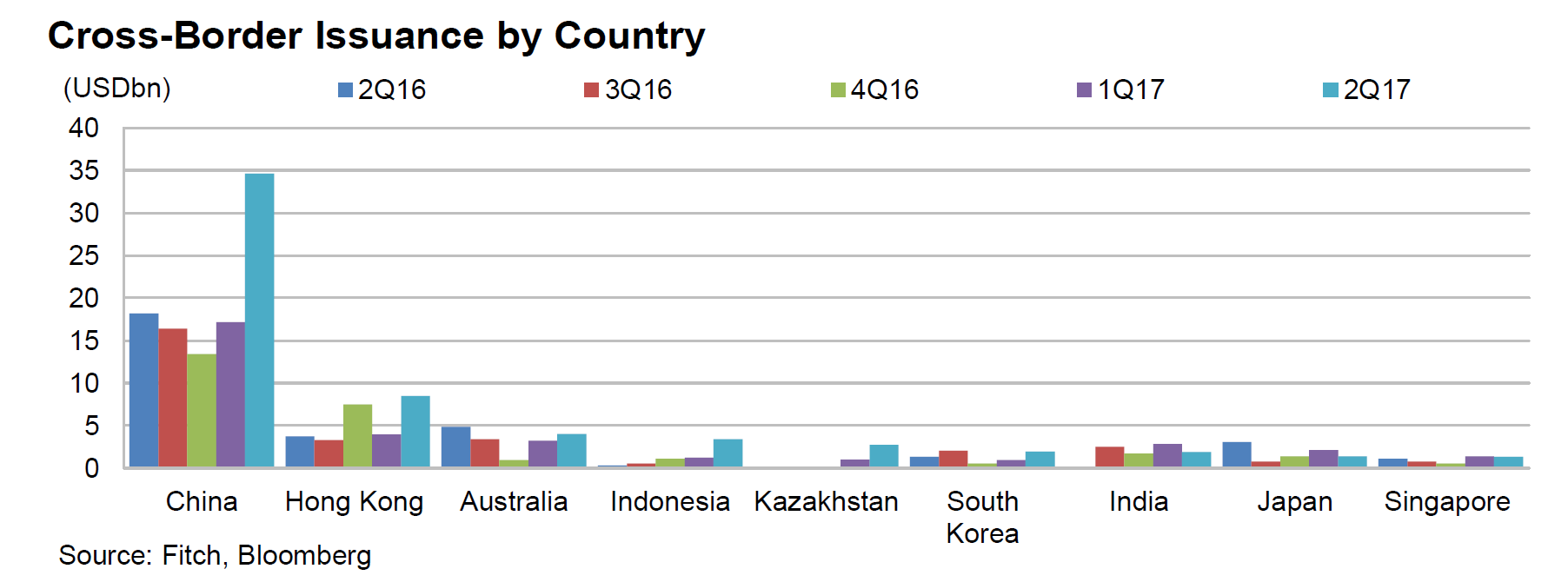The cross-border issuance of foreign currency bonds by corporates in Asia-Pacific almost doubled in the second quarter of 2017 to hit a record high US$61 billion, underpinned by the surge in transactions by Chinese companies, according to a Fitch Ratings report.
The US$61 billion issuance represented a new record for a single quarter and a huge increase from US$35 billion in the first quarter of the year. The total cross-border issuances in the first half of this year already represented 87% of the total volume in 2016.

Fitch says the tight domestic funding environment is likely to keep the Chinese cross-border issuance relatively high during the rest of the year on the back of certain restrictions imposed by the regulators. It notes the outstanding foreign currency debt of Chinese corporates is still low and should not pose a systemic risk to debt sustainability, but the strong issuance could create isolated vulnerabilities.
Chinese corporates contributed the most to the increase in the second quarter, surging to US$35 billion – also a record – from US$17 billion in the previous quarter. There were also strong quarter-on-quarter increases in issuance by corporates in Hong Kong, Australia, Korea and Indonesia – the latter seen by Asian investors as a way to diversify away from Chinese exposure.
As the Fitch report points out, Chinese corporates are tapping the offshore bond markets in response to tighter conditions and higher yields in the local market following the government clampdown on risky practices in shadow banking and the imposition of certain restrictions on borrowing to contain leverage.
Bond market access of almost all corporates has been affected. As a result, the onshore issuance by Chinese corporates plunged 29% year-on-year in the second quarter of 2017 to 1.25 trillion yuan (US$187.70 billion). There were 256 primary market transactions valued at 225.3 billion yuan that had been cancelled or delayed.
In contrast, Fitch notes, the cost of US dollar bond issuance has remained relatively flat, and therefore become more attractive – particularly for investment grade corporates. In addition, the concerns about a fall in the renminbi, which would push up the cost of servicing foreign currency debt, have faded this year.
More targeted restrictions have also persuaded some Chinese corporates to access the offshore bond market. For instance, the rules on property developers tapping the onshore exchange bond market were tightened in November 2016, which resulted in a 10-fold increase in their cross-border issuance in the first half of 2017, compared to the same period a year ago. Property developers accounted for 40% of all Chinese offshore issuance in the second quarter of 2017.
Fitch says the Chinese cross-border issuance is likely to remain relatively robust if the domestic funding conditions remain tight. However, it warns that there are factors that could slightly dampen the activity in the second half of 2017.
First, Fitch expects the Fed funds rate to increase by 50bp by the end of 2017 and another 100bp in 2018, while it anticipates no further broad-based tightening by the People’s Bank of China. This would weaken the incentive for cross-border issuance and might fuel renewed renminbi fears.
Second, the National Development and Reform Commission warned on June 12 that companies that fail to pre-register offshore issuance with a maturity of more than one year will be blacklisted. Some issuers have raised funds through short-term offshore notes, but that could prompt further action from the regulator, adds Fitch.









